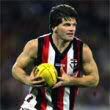The changing face of footy
Michael Voss | March 20, 2008
I CAN'T help but think Rod Butterss might be sitting back in his palatial home at Brighton, sipping a cold sauv blanc, with a big "I told you so" smirk on his face. Or a frustrated snarl.
Or whatever it is you get when the club in which you have played a major development role, only to be turfed out, is finally set to challenge for the premiership that has eluded it since 1966.
It is too early in the season to tell if Butterss' big call to replace coach Grant Thomas with Ross Lyon at the end of the 2006 season is on the money but he might just be the messiah because the Saints loom as the main challenger to the might of Geelong.
The NAB Cup champions, who have teased us in recent years, are a much better side following the addition of experienced ruckmen Steven King and Michael Gardiner, crumbing forward Adam Schneider, lead up forward Charlie Gardiner and shutdown onballer Sean Dempster.
They are very solid through the midfield and have real power up forward. The question is whether their defence will stand up.
Max Hudghton doesn’t get the accolades he deserves but must stay healthy. Likewise, Matty Maguire. And I really like the role Sam Fisher plays. He's one of the league’s underrated players.
St Kilda looks ready to me. It is in a good phase of its list development, has a lot of strong, mature bodies, a good spread of experience, and its time will be in the next two to three years.
What intrigues me is the process behind the Butterss decision to replace Thomas, and the long-term football implications for a decision that, personalities aside, seems to have been made on business-related principles.
Having spent a lot of time over the past 18 months working in corporate leadership and coaching, I’ve learned that, as much as we often hear how business can learn a lot from sport, so, too, can sport learn a lot from business.
Often we see top-end companies employ a chief executive on a specific time-frame with a specific objective.
When the job is done, irrespective of how healthy the organisation is, he's moved on and replaced by another "specialist" with equally specific objectives in a different cycle in the business.
Are we heading down the same path with senior football coaches? Is it now the time to consider "specialist" coaches for each phase of development?
Clearly, Thomas was moved on because Butterss and his St Kilda board at the time didn’t think he could take the club to the next step. To win a premiership.
It was a controversial call at the time. Thomas had a 63-59 win/loss record in five plus years at the helm, with one draw.
He was 46-26 in his last three years, and had taken the club to two preliminary finals.
But Butterss ruled Thomas had done all he could do. Just like the chief executive who is employed to rebuild a company’s stocks and then cut loose.
The question is whether this transition can happen more effectively, efficiently and seamlessly so as to avoid wasting 12 months in behind-the-scenes feuding and board room challenges.
Might we now see a coach with a development slant employed for a limited time frame and then replaced by a coach with a premiership slant for no other reason than his job is done?
It's like a specialist "closer" in Major League Baseball. That’s a pitcher who spends most of the day in the dugout, yet is asked to finish the job in the last innings.
Perhaps Kevin Sheedy is a good example in football parlance.
Sheeds is a four-time premiership coach and knows how to get the best out of sides at finals times.
He’s a coach who might specialise in the premiership phase. Certainly, even at age 60, it wouldn’t surprise me to see the 27-year Essendon boss get another crack at it because he might just suit the short-term needs of a club believing it is on the verge of a flag.
I love the concept of challenging traditional thinking and looking outside the square.
Paul Roos does it beautifully — even if it can land him in trouble at times. It’s gone largely unnoticed that part of the reason for the Roos tanking controversy and his "don’t kick a goal" comment to Jarrad McVeigh was the fact that he was coaching on the sideline.
Otherwise, whatever he said would never have been heard by anyone except coaching colleagues. Roosy is a huge fan of American football and my mail is that he may well coach at times from the sideline this year, just as they do in the National Football League.
He did it three times in the pre-season because he wants to be able to talk one-on-one with his players on the boundary line.
It raises the issue of maintaining full communication with his support coaches in the coach’s box, and the role that technology can play in this area.
But at a time when science is taking on an even bigger role in our game, it’s an interesting, progressive and personal initiative.
He should have been applauded for his thinking — not castigated for a simple throw-away line.
Michael Voss on RL and the changing face of footy
Moderators: Saintsational Administrators, Saintsational Moderators
- Oh When the Saints
- Saintsational Legend
- Posts: 5621
- Joined: Wed 29 Mar 2006 4:25pm
- Location: QLD
- Contact:
Michael Voss on RL and the changing face of footy
They should only play AFL games now when it's raining. Slow games of footy are so much better to watch.
